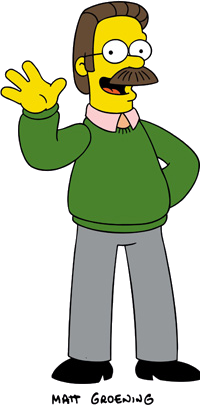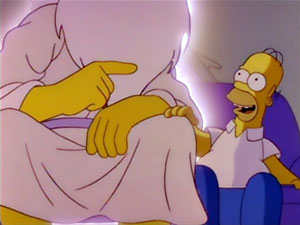
Springfield is the primary fictional setting of the American animated sitcom The Simpsons and related media. It is an average-sized, fictional city within an unknown state in the United States. The fictional city's geography, surroundings, and layout are flexible, often changing to accommodate the plot of any given episode.

Nedward "Ned" Flanders Jr., commonly referred to by his surname, is a fictional character in the animated television series The Simpsons, voiced by Harry Shearer and first appearing in the series premiere episode "Simpsons Roasting on an Open Fire." He is the good-natured, cheery next-door neighbor to the Simpson family and is generally loathed by Homer Simpson, though there are numerous instances where the two are portrayed as good friends. A scrupulous and devout Evangelical Christian, he is among the friendliest and most compassionate of Springfield's residents and is generally considered a pillar of the Springfield community.
"Bart of Darkness" is the premiere of the sixth season of the American animated television series The Simpsons. It originally aired on the Fox network in the United States on September 4, 1994. In the episode, Bart breaks his leg and becomes increasingly isolated. Spying on Ned Flanders from his room, Bart suspects that Ned has murdered his wife. The episode was produced during the 1994 Northridge earthquake, which delayed production by a month, and is largely a parody of the Alfred Hitchcock's Rear Window (1954).

"Homer the Heretic" is the third episode of the fourth season of the American animated television series The Simpsons. It originally aired on the Fox network in the United States on October 8, 1992. In the episode, Homer decides to forgo going to church and has an excellent time staying home. His behavior quickly attracts the wrath of God, who visits him in a dream. The chalkboard gag from this episode was a reference to the previous episode "A Streetcar Named Marge", which had made controversial references to New Orleans.

"Mr. Plow" is the ninth episode of the fourth season of the American animated television series The Simpsons. It originally aired on the Fox network in the United States on November 19, 1992. In the episode, Homer buys a snowplow and starts a business plowing driveways. It is a huge success, and inspired by this, Barney Gumble starts a rival company and quickly puts Homer out of business.

"Treehouse of Horror IV" is the fifth episode of the fifth season of the American animated television series The Simpsons and the fourth episode in the Treehouse of Horror series of Halloween specials. It originally aired on the Fox network in the United States on October 28, 1993, and features three short stories called "The Devil and Homer Simpson", "Terror at 5+1⁄2 Feet", and "Bart Simpson's Dracula".

"Lisa's First Word" is the tenth episode of the fourth season of the American animated television series The Simpsons. It was first broadcast on the Fox network in the United States on December 3, 1992. In the episode, as the Simpson family gathers around Maggie and tries to encourage her to say her first word, Marge reminisces and tells the story of Lisa's first word. Maggie's first word is voiced by Elizabeth Taylor.
"Dead Putting Society" is the sixth episode of the second season of the American animated television series The Simpsons. It originally aired on the Fox network in the United States on November 15, 1990. In the episode, Homer and Ned quarrel and bet which of their sons, Bart or Todd, will win a miniature golf tournament. Homer is confident Bart will win and bets that the father of the boy who does not win must mow the other's lawn in his wife's Sunday dress.
"Radio Bart" is the thirteenth episode of the third season of the American animated television series The Simpsons. It originally aired on the Fox network in the United States on January 9, 1992. In the episode, Bart receives a microphone that transmits sound to nearby AM radios. To play a prank on the citizens of Springfield, he lowers a radio down a well and uses the microphone to trick the town into thinking a little boy is trapped there. The prank succeeds, but Bart remembers labelling the radio with his name, tries to retrieve it, and becomes trapped himself. Angry at being duped by Bart, the townspeople refuse to rescue him.
"Thirty Minutes over Tokyo" is the twenty-third and final episode of the tenth season of the American animated television series The Simpsons. It first aired on the Fox network in the United States on May 16, 1999. In the episode, after being robbed by Snake Jailbird, the Simpsons visit a money-saving seminar, where they learn ways to limit their expenses. Soon, the family can afford a cheap last-minute flight to another country, the only disadvantage being that they do not know where their plane tickets will bring them, which leads them to spend their vacation in Japan.
"Bart the Lover" is the 16th episode of the third season of the American animated television series The Simpsons. It first aired on the Fox network in the United States on February 13, 1992. In the episode, Bart, playing a prank on his teacher Edna Krabappel, responds to her personal ad as a man named Woodrow. In the subplot, Ned Flanders asks Homer to curtail his swearing, so Homer starts using a swear jar.
"So It's Come to This: A Simpsons Clip Show" is the eighteenth episode of the fourth season of the American animated television series The Simpsons. It originally aired on the Fox network in the United States on April Fools' Day, 1993. In the episode, Homer plays a series of practical jokes on Bart, and to get even, Bart shakes up a can of Homer's beer with a paint shaker. Homer opens the can, resulting in a huge explosion that lands him in the hospital, where he goes into a coma. At Homer's bedside, the Simpson family reminisce, mainly about moments relevant to Homer's life.
"Summer of 4 Ft. 2" is the twenty-fifth and final episode of the seventh season of the American animated television series, The Simpsons. It originally aired on the Fox network in the United States on May 19, 1996. In the episode, the Simpson family stay in Ned Flanders' beach house. Hanging around with a new set of children, Lisa becomes popular, while Bart is left out. Bart tries to sabotage his sister's newfound acceptance, but fails.
"The Front" is the nineteenth episode of the fourth season of the American animated television series The Simpsons. It originally aired in the United States on the Fox network on April 15, 1993. In the episode, Bart and Lisa decide to write an episode of The Itchy & Scratchy Show; after their script is rejected, they resubmit it under the name of their grandfather Abraham Simpson, resulting in Grampa being hired as a staff writer. Meanwhile, Homer returns to high school to retake a failed science course.
"Home Sweet Homediddly-Dum-Doodily" is the third episode of the seventh season of the American animated television series The Simpsons. It originally aired on the Fox network in the United States on October 1, 1995. In the episode, the Simpson children are put in foster care at Ned and Maude Flanders' house. Homer and Marge are forced to attend a parenting class to get their children back.
"Bart's Comet" is the fourteenth episode of the sixth season of the American animated television series The Simpsons. It originally aired on the Fox network in the United States on February 5, 1995. In the episode, Bart Simpson accidentally discovers a comet, which is heading towards Springfield. The show's writing staff saw an issue of Time magazine that presented the threat of comets hitting Earth on its cover, and decided to create an episode in a similar vein. "Bart's Comet" contains references to Where's Waldo? and The Twilight Zone, and received positive reviews.
"Bart's Dog Gets an 'F'" is the sixteenth episode of the second season of the American animated television series The Simpsons. It originally aired on the Fox network in the United States on March 7, 1991. In the episode, the Simpson family's dog, Santa's Little Helper, infuriates Homer and Marge by destroying a family heirloom and an expensive pair of shoes. When Marge and Homer want to get rid of the dog, Bart enrolls him at an obedience school to curb his bad behavior.
"Saturdays of Thunder" is the ninth episode of the third season of the American animated television series The Simpsons. It originally aired on the Fox network in the United States on November 14, 1991. In the episode, Homer realizes he knows little about Bart and strives to be a better father. When he learns Bart is competing in a Soap Box Derby, Homer helps him make a racer. Bart drives Martin's far superior racer instead, hurting Homer's feelings. Homer eventually realizes he must be a good father by supporting Bart.

The sixth season of the American animated television series The Simpsons originally aired on the Fox network between September 4, 1994, and May 21, 1995, and consists of 25 episodes. The Simpsons is an animated series about a working class family, which consists of Homer, Marge, Bart, Lisa, and Maggie. The show is set in the fictional city of Springfield, and lampoons American culture, society, television and many aspects of the human condition.







